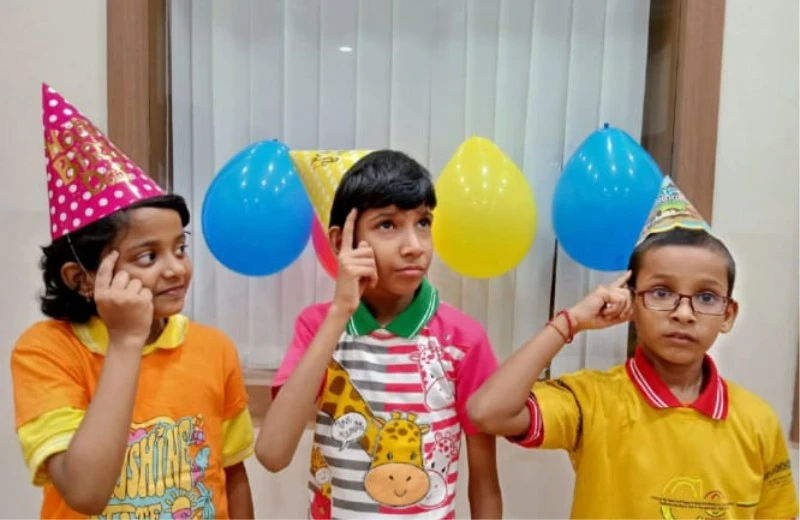Preschool is a crucial stage in a child's development where they begin to explore the world around them, learn new skills, and develop a foundation for future learning. While academic achievement is undoubtedly important in preschool learning, at the best preschool in Kolkata it's equally vital to focus on nurturing social and emotional development in preschoolers. Building emotional intelligence at this stage can have a lasting impact on a child's overall well-being and success in life. In this article, we will explore the significance of emotional intelligence, its role in preschool learning, and strategies for fostering it at a top primary school near Bansdroni.
Understanding Emotional Intelligence in Preschoolers
Emotional intelligence refers to the ability to recognize, understand, manage, and effectively use emotions in ourselves and others. It plays a significant role in various aspects of life, including relationships, communication, decision-making, and mental health. Developing emotional intelligence in preschoolers sets the stage for healthier emotional and social interactions as they grow older.
Preschoolers are at a unique stage of development where they are discovering a wide range of emotions and learning how to express themselves. By providing them with the tools to navigate these emotions, at the best primary school near Bansdroni we empower them to form meaningful connections and develop self-awareness.
The Role of Emotional Intelligence in Preschool Learning
While traditional preschool curricula focus on cognitive skills like counting, reading, and writing, emotional intelligence is often overlooked. However, research suggests that emotional intelligence is closely tied to academic success and can significantly impact a child's ability to learn and thrive in a classroom environment.
Preschoolers with well-developed emotional intelligence are more likely to exhibit qualities such as empathy, self-regulation, and effective communication. These qualities not only create a positive classroom atmosphere but also contribute to improved concentration, problem-solving skills, and cooperation among peers. As preschoolers from the best preschool in Kolkata learn to recognize and manage their emotions, they become better equipped to handle the challenges that academic learning presents.
Strategies for Building Emotional Intelligence in Preschoolers
Emotion Identification and Expression: Create a safe and nurturing environment where children feel comfortable expressing their emotions. Encourage them to use words to describe how they feel and validate their emotions. Use activities such as storytelling, role-playing, and art to help preschoolers identify and express different emotions.
Emotion Vocabulary Building: Introduce a wide range of emotion words to preschoolers and help them understand the nuances of each emotion. Use picture books, flashcards, and discussions to expand their emotional vocabulary.
Empathy Development: Engage preschoolers in activities that promote empathy, such as sharing stories about different people's experiences, discussing how actions affect others, and encouraging acts of kindness. Role-playing scenarios can help children step into others' shoes and understand varying perspectives.
Emotion Regulation Techniques: Teach preschoolers simple emotion regulation techniques, such as deep breathing or counting to ten, to help them manage challenging emotions like anger or frustration.
Social Skills Building: Plan group activities that encourage teamwork, cooperation, and communication. Games that involve turn-taking, problem-solving, and collaborative decision-making help preschoolers develop essential social skills.
Conflict Resolution: Guide preschoolers through conflicts and disagreements by teaching them effective ways to resolve issues. Encourage active listening and communication, and help them find mutually acceptable solutions.
Modeling Emotional Intelligence: Preschoolers often learn by observing adults. Model emotional intelligence in your interactions with them and demonstrate healthy ways to express and manage emotions.
Storytelling and Discussion: Share age-appropriate stories or scenarios that highlight emotional situations. Engage preschoolers in discussions about how characters felt, why they felt that way, and how they resolved their emotions.
Mindfulness and Self-Awareness: Introduce simple mindfulness exercises to help preschoolers become more aware of their thoughts and feelings. Activities like guided imagery or mindful breathing can promote self-awareness and emotional understanding.
Family Involvement: Collaborate with parents to reinforce emotional intelligence skills at home. Provide resources and suggestions for incorporating emotional intelligence activities into daily routines.
Nurturing social and emotional development in preschoolers is a vital component of preschool learning in early childhood education. By focusing on emotional intelligence alongside academic learning, preschools in Kolkata and beyond can equip children with the skills they need to succeed academically, and build strong relationships, and navigate life's challenges. Through thoughtful and intentional strategies, we can shape a generation of emotionally intelligent individuals who are poised to make a positive impact on their communities and beyond.


